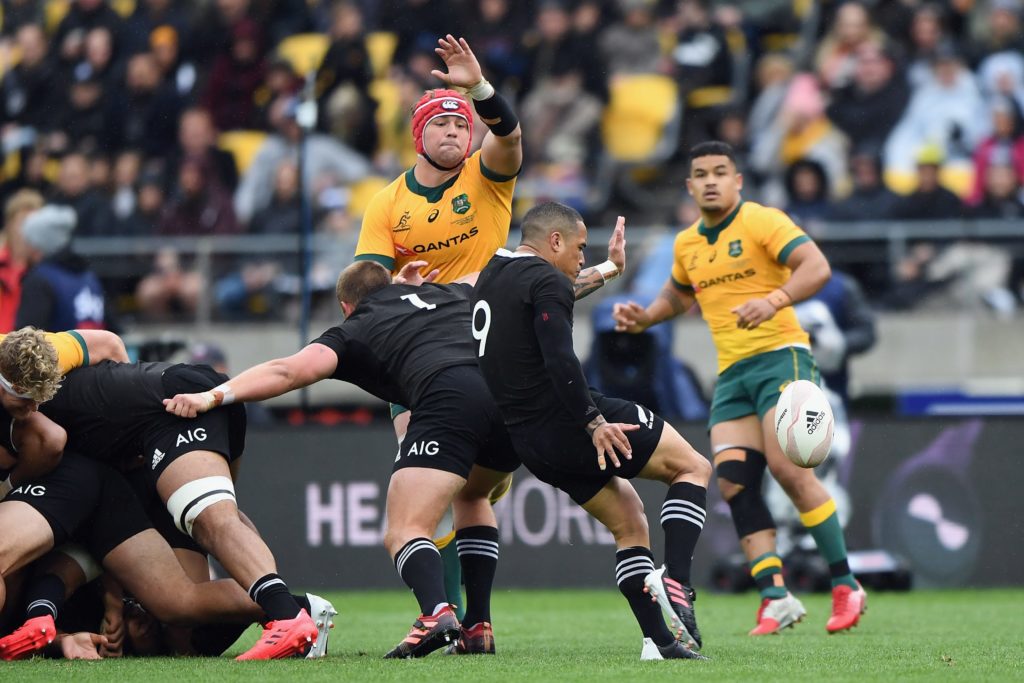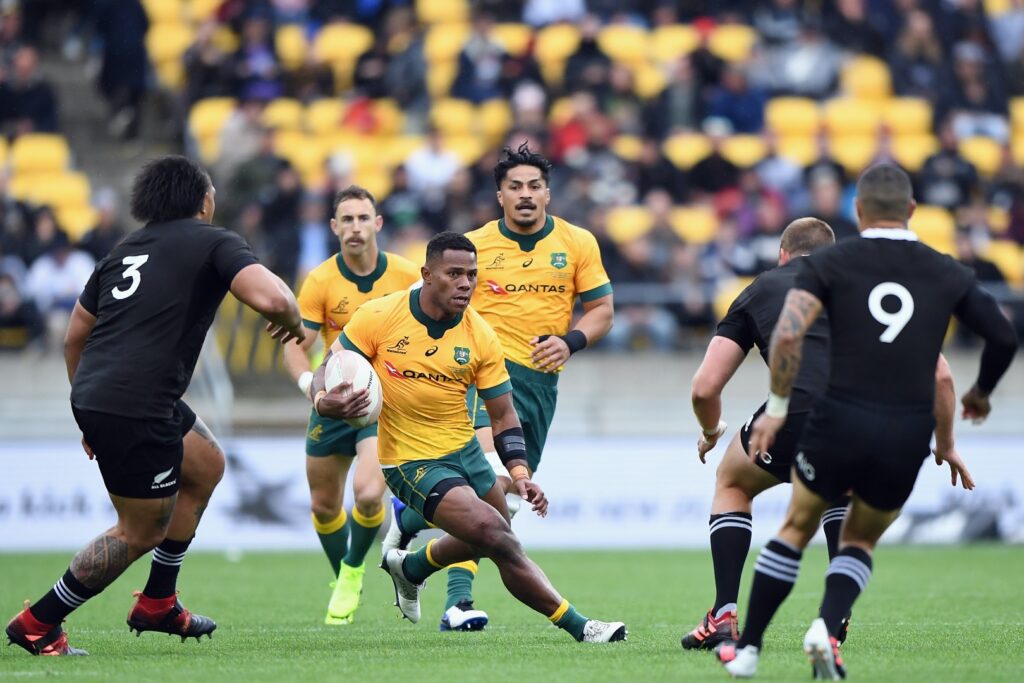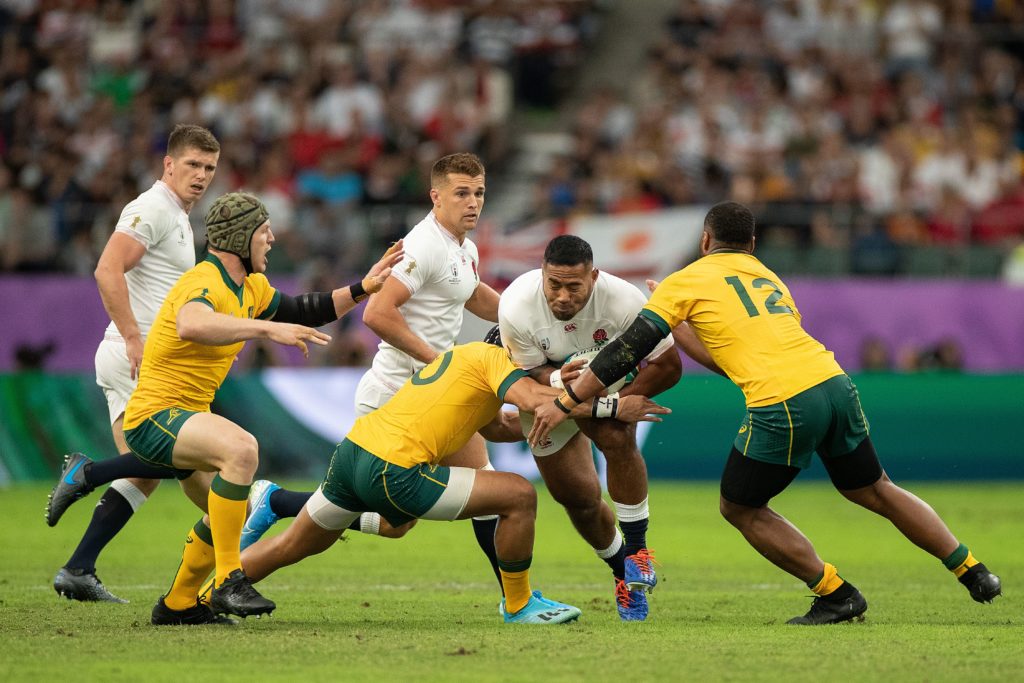“They’re coming”.
Actually Scott Robertson, they’re already here.
Robertson’s warning in March this year referred to the next generation of Wallabies players just hitting the professional ranks in 2020, one of Australia’s most promising crops in years.
The former All Blacks No 8 clearly also has ability in the talent identification and player management department after a Super Rugby four-peat as coach of the Crusaders.
And as Australia’s on field fortunes started to slowly turn in Super rugby this year, before Covid-19 cut the international version short, Robertson had declared a certain affection for Australia’s newest stars.
“I’ve officially fallen for, have I mentioned, Harry Wilson,” Robertson declared. “As an ex-No 8, his ability to set a bit of footwork is special. The other No 7, Liam Wright, and even the guy [Fraser McReight] off the bench … they’re coming.”
Wilson, Wright and McReight had all starred the previous week for Brad Thorn’s Queensland Reds as the young side had only just failed to topple the champion Crusaders on their home turf, losing 24-20 despite scoring four tries to three.
In that game the 195cm bullocking backrower Wilson continued the cracking pace he set since debuting, carrying the ball an all-time competition-record 26 times into the teeth of the world’s best provincial team.

But while a big build and sharp footwork are a rare enough combination, what makes the likes of Wilson and his young teammates even rarer in Australian rugby is what’s happening in the all-important top few inches.
These kids aren’t carrying the baggage of almost two decades of New Zealand dominance, and Wilson is the best example of that.
Take on the champion Crusaders at home and believe you should have won that one? Tick.
Draw with New Zealand at home, on debut, and reckon you should have claimed that one too? Damn right.
Robertson’s warning in March this year referred to the next generation of Wallabies players just hitting the professional ranks in 2020, one of Australia’s most promising crops in years.
Crusaders coach Scott Robertson
And what about heading to Eden Park, a famous graveyard for Australian rugby, where the last time won there was 1986. The last time Australia won anywhere in New Zealand, Wilson was a year old.
“Next week we’re pretty excited to go out there and try and get the win at Eden Park which hasn’t been done in a long time,” Wilson declared in the sheds after the Bledisloe opener in Wellington. “I know all the boys are extremely confident for it, and we believe in each other and we believe in the team, so I definitely believe it can happen.”
Why wouldn’t he? Wilson and fellow Wallabies squad members backrower McReight, fly-half Noah Lolesio and Will Harrison, prop Angus Bell and second-rower Trevor Hosea, all came into the national squad from the Australian Under-20s team that defeated their New Zealand counterparts 24-0 last year.
And all six were already standouts in Australian Super rugby this year, already amongst Australia’s best before they hit 21.
In Bledisloe One, Wilson started at blindside and Lolesio was on the bench, but the mix of old and young and the pointers to a bright future were stark in coach Dave Rennie’s line up.
Australia’s 23 man side, that earned the draw with the All Blacks, had a total of 676 caps between them.
But in Michael Hooper’s 100th Test (and James Slipper’s 97th and Rob Simmons 101st) four players were named as debutants (Wilson, Filipo Daugunu, Hunter Paisami and Noah Lolesio) and a further six players had fewer than 10 caps.
Nearly half of the Wallabies caps came from just three players.
In the All Blacks 23, only George Bridge and Shannon Frizell, with nine caps before the match, joined their three debutants under the 10 cap mark in a more evenly distributed total of 814 for the home side.
Australia had a new coach, a fresh inexperienced team and yet they came away strongly of the belief they had deserved the win.

Debutant Daugunu put in a man of the match performance on the wing, but it’s worth noting that plenty of his game-high metres carried were as a result of the youngster wearing the No 6 gold jersey probing that left-hand edge defence of the All Blacks and creating space.
With the wide running Pete Samu and Michael Hooper in the back-row, Wilson’s selection was bold, and a big performance was a critical factor in competing with a back-row led by World Cup winner Sam Cane.
Wilson played with the confidence and belief he’s shown on and off the field this year.
When he joined our Rugby Ruckus podcast two months back, the clues were there.
At the time the rugby landscape was in a complete state of flux, with nothing certain. As financial pressure was applied, Wilson declared he was going nowhere, that playing for Australia and in Australia was his lifelong dream.
And when he was asked about whether he thought a Trans-Tasman competition was the best way forward rather than a domestic competition, he was clear.
“I’m a big supporter of playing New Zealand teams and the Trans-Tasman comp,” he said. “Because I guess they’re supposed to be the best in the world, so I guess as the Reds we want to test ourselves against the best teams, the best players, so I’d definitely love to be able to play them next year. It’d be unreal.”
Note that there’s a fair bit of leeway in that description of the status of the New Zealand teams.
And now Wilson has already received that chance in taking on the All Blacks, and he certainly won’t be the last of this group to enjoy their first clash with the traditional rival.
Because I guess they’re supposed to be the best in the world, so I guess as the Reds we want to test ourselves against the best teams, the best players, so I’d definitely love to be able to play them next year. It’d be unreal.”
Wallabies loose forward Harry Wilson
His team-mates like McReight and Wright will get their chance, with Rennie certain to blood more of the up-and-comers, and to continue to build the experience and the combinations that can ground a squad of young men into a fighting unit.
Rennie shapes as the right man at the right time to create that environment too. The quietly spoken Kiwi is known for playing a role of leader, mentor and friend to his players and building that belief.
The Michael Cheika team that preceded this group, that fell early at a World Cup, was characterised by a siege mentality that dug deeper trenches into the Australian psyche with every All Blacks blow.
The confidence Wilson and this group exude now isn’t the same aloof approach those build-the-wall Wallabies had previously.
It’s a quieter, calmer voice and belief, in which you can hear the purpose of the likes of Rennie and Queensland coach Brad Thorn.
Belief that is growing not just in the team, but in Australian rugby.
A belief that shouldn’t be misconstrued as an expectation that this side will belt the All Blacks, and win every game.
After all, Rennie’s youngsters are being baptised in probably the most challenging environment a young Australian rugby player could experience.
COVID lockdowns, quarantine regulations, and four first up games against the All Blacks is unprecedented.

But the growing belief is that this team can and will continue to improve, and can and will make Australians proud of their Wallabies.
And maybe, just maybe, the timing is right for the four-year World Cup cycle.
When Rennie named his 44-man squad for this Test season, there were 16 uncapped players, and a further 13 players with less than 10 caps.
That means a massive 29 of the 44 were at the start of their international career. Little wonder the average age of the squad is only 24.
And then, as caustic as this initiation is, they went out and grabbed a 16-all draw in New Zealand to almost start to shrug off some of the historical weight that shadows the Wallabies recent record.
We know they’re not going to win every game, but for starved Australian rugby fans, there’s real reason to hope this is the start of a journey to winning the one we all care about the most in four years’ time.



Comments
Join free and tell us what you really think!
Sign up for free